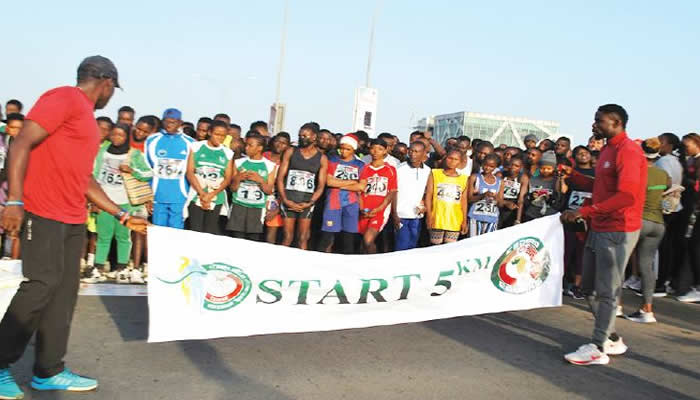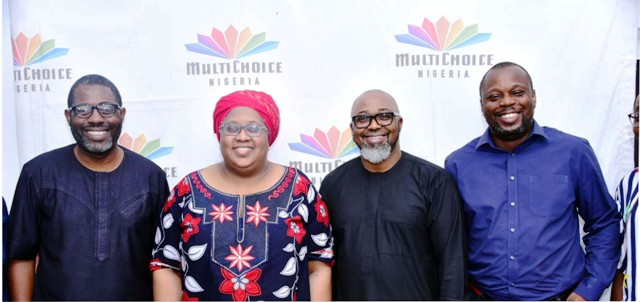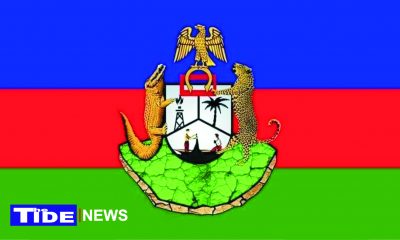Sports
ASEC Mimosas Still In Bloom On Solid Foundation
Imagine supporting a team made up entirely of young local players who have known each other all their lives, who have grown up, trained and progressed together, made their professional debuts together and won trophies together.
A utopia to many, that dream is one that has been fulfilled by the fans of ASEC Mimosas, the Côte d’Ivoire club whose history has been made all the more glorious by their ability to nurture and get the best out of their home-reared talents.
ASEC stands for “Amicale Sportive des Employés de Commerce” (Sporting Association of Business Employees). As that name suggests, it was founded by a group of workers employed by companies in the Ivorian capital of Abidjan, all of them football fanatics.
Hailing from France, Burkina Faso, Benin, Ghana, Togo, Senegal and Lebanon, they pooled their passion for the game and founded a club, which came into being on 1 January 1948 in an Abidjan suburb by the name of Sol Beni (French for “blessed sun”). Adopting the mimosa flower as the club’s symbol, one that still features on its badge, they also chose yellow and black as the colours of the new outfit.
Stepping out in the Abidjan League, they would quickly strike up a rivalry with Africa Sports, the team that would become their eternal foes. Coached initially by co-founder Trenou Alfred Seho and then by George Koffi, it was under the Frenchman Guy Fabre, ASEC Mimosas’ first professional coach, that the club began to lay solid foundations. Appointed in 1954, Fabre preached a simple maxim that would later become the club motto: “Children have fun when they play football”.
Fabre’s charges proved him right when they went out and won the Abidjan championship in his first year at the helm. It was the first of many trophies that would come ASEC’s way. In 1955 he led his team to the final of the French West African Cup, where they lost out to Senegal’s US Goree. The Abidjan side appeared in the final again in 1956 and 1958, and though they came away empty-handed on both occasions, the experience was to stand them in good stead.
Four years after the second of those defeats they secured their maiden national trophy, the Côte d’Ivoire Cup, which was followed 12 months later by their first league title triumph.
Les Jaune et Noir (yellow and Balck) enjoyed a purple patch at the end of the decade, winning the cup four times in a row between 1967 and 1970, the last of those successes coinciding with a second league crown. Though coaches came and went, ASEC maintained their reputation as a flowing, inventive team, one spearheaded at the time by the striker, Laurent Pokou.
Four straight championship wins followed between 1972 and 1975, with the Abidjan side adding further cups in the first two of those seasons. Having satisfied their fans’ every wish on the domestic front, they then set their sights on conquering Africa.
Their initial forays in the African Cup of Champions Clubs met with little success. However, they did reach the semi-finals in 1971 and again in 1976, losing to Canon Yaounde of Cameroon and Hafia FC of Guinea respectively, a 5-0 second-leg defeat in the latter tie bringing an ignominious end to a golden era.
The return of Fabre in 1979 yielded a seventh domestic crown a year later, the end of a five-season drought. Nevertheless, it would be another decade before they reigned at home again.
The gloom was only lifted with the arrival of Roger Ouegnin as president, the catalyst for their emergence as the premier force in Ivorian football. The son of one of ASEC’s founding fathers, who had himself occupied the president’s seat in the late 1950s, Ouegnin brought the fading Mimosas back to life, pulling off his first masterstroke by appointing Frenchman Philippe Troussier as head coach. A championship hat-trick followed and even when Troussier left to be replaced for successive one-season spells by Eustache Mangle, Charles Albert Roessli and Mamadou Zare, the trophies kept coming.
ASEC’s supremacy was underlined by the fact that they went unbeaten in 108 games from December 1989 to June 1994. Club heroes Alain Gouamene, Abdoulaye Traore (also known as Ben Badi), Donald Sie and Basile Aka Kouame were so influential at the time that they also formed the backbone of the Côte d’Ivoire side that won the country’s one and only CAF African Cup of Nations title in 1992.
The highlight of that golden period would be reached in 1998, when after four semi-final failures and a 1995 final defeat to South Africa’s Orlando Pirates, ASEC finally tasted glory in the CAF Champions League (formerly the African Cup of Champions Clubs), beating Dynamos of Zimbabwe in the final.
Perhaps Ouegnin’s greatest achievement, however, was to co-found the fabled Academie MimoSifcom in 1994 with former France international Jean-Marc Guillou. Unique in Africa, the academy has churned out a succession of talented players over the years.
Open to children from all social and ethnic backgrounds, it lays on free trials and provides its students with a training cycle that can run for as long as seven years, as well as a school education. The centre soon began to pay dividends, with its first graduates picking up the baton from the 1998 Champions League-winning side.
They showed their worth as early as February 1999, when an ASEC side featuring not one player over the age of 18 took on the mighty Esperance of Tunisia in the CAF Super Cup. Displaying a telepathic understanding, the untried teenagers swept to an emphatic 3-1 win, although with a teamsheet featuring the likes of Kolo Toure, Aruna Dindane, Boubacar Barry and Didier Zokora, a result like that should have come as no surprise.
ASEC have continued to reap the rewards of Ouegnin’s bold presidency and his lasting investment in the club’s future. Such has been Les Mimos’ domination in recent times that they have won an incredible 16 of the last 20 league titles. The man entrusted with the task of keeping the reigning Ivorian champions at the top of the pile is another Frenchman, Sebastien Desabre, who took over in October 2010.
ASEC’s Stadium
Built in 1964 to host the Abidjan Games, the Stade Geo Andre has since changed its name to the Stade Felix Houphouet-Boigny, in honour of Côte d’Ivoire’s first president, the father of the nation. Ask any local fans where ASEC play, however, and they will answer, “Le Felicia”, the nickname by which the ground is more commonly known.
With a capacity of 65,000, the stadium is also the venue for the national team’s home games, and staged matches at the 1984 African Cup of Nations. It was last refurbished in 2009, in preparation for the African Nations Championship.
Culled from FIFA.Com.
Sports
NFL champion Reveal plans to unveil sports academy
The Nigerian-born American football player, Morotoluwa Ojomo, who recently won the 2025 National Football League Super Bowl with the Philadelphia Eagles, has revealed plans to establish an academy in Nigeria aimed at empowering young athletes.
Ojomo, who arrived in Lagos on Wednesday with his parents and sister, spoke about his vision to create opportunities for the youth and to nurture the next generation of athletes in Nigeria.
Ojomo, at a meeting with the Chairman of the Nigerians in Diaspora Commission, Abike Dabiri-Erewa, on Saturday in Abuja, shared his belief that the future of Nigeria lies in investing in its youths.
In addition to his plans for the academy, Ojomo also discussed his commitment to working with local organisations to promote flag football in Nigeria, with the hope of qualifying teams for the 2028 Olympics.
In the meeting yesterday, we proposed a plan to ultimately build an academy that not only promotes Nigerian-born athletes overseas or Nigerian descendants who come back and visit but also points to the youths and gives them abilities to grow in strength and grow into skill. That is what is in the pipeline.
“The goal is to see Nigerians doing well in American football. I believe the sport is not popular in Nigeria because people do not understand it.
“There is a lot of work being done with the flag football team. Some tryouts are happening in Lagos right now. I think they want to get them ready for the Olympics in 2028,” the footballer explained.
He emphasised the importance of providing young people with the resources and platforms to grow in both strength and skill, with the ultimate goal of making Nigeria the greatest country in the world.
“The youth is where change is made, and investing in them is of the utmost importance,” he said.
Ojomo, who was born in Lagos and moved to California at the age of seven, reflected on his own journey to success and how his Nigerian roots played a vital role in shaping his determination and perseverance.
He credited his upbringing for the values that helped him achieve his Super Bowl victory with the Philadelphia Eagles, a feat that has now placed him alongside other Nigerian-born NFL champions.
“I would not be here without Nigeria. I think that there is a saying that the grass is not greener where you go, it’s greener when you water it. We have the opportunity to water it,” he said.
He expressed his belief that Nigeria is a country full of potential, and through collaboration and investment in the youth, Nigeria can become a global leader in sports.
“What we are working on now is just to provide more opportunities for the youths and ultimately make Nigeria the greatest country in the world. So that’s the goal,” Ojomo remarked during the meeting.
Abike Dabiri-Erewa, in her remarks, congratulated Ojomo on his Super Bowl victory and his contributions to promoting Nigeria’s name on the global stage.
She acknowledged the national honor that will be conferred on him by the Nigerian government, noting that his success serves as an inspiration for younger Nigerians.
She expressed her appreciation for Ojomo’s dedication to his roots and his vision for creating lasting change in the country.
“We thank you for making us so proud and I know that you are passionate about your country. You are passionate about the younger Nigerians, and you want to make a difference in their lives.
“Home will always be home, no matter how much you excel abroad,” she said, inviting him to participate in the upcoming Diaspora Day on July 25 to share his story and inspire others.
Ojomo, who was born in Lagos in 2001 and moved to California at age seven, played a key role in the Eagles’ Super Bowl win, securing their second-ever championship title.
His victory places him alongside other Nigerian-born NFL champions, including C.J. Uzomah, Chukwuebuka Godrick, Chris Oladokun, and Charles Omenihu.
Sports
ECOWAS Marathon: Nigerians win 5km
 Marathoners set to take off.
Marathoners set to take off.Kenyans and Ethiopians dominated the half-marathon event of the ECOWAS Abuja International Marathon on Saturday, while Nigerian runners claimed victory in the 5km race.
Kenya’s Harrison Muchira Wanjiru won the men’s half-marathon in 1 hour 04.39 minutes, followed by compatriot Adam Sulaiman Muhamad, who finished second in 1.05.27, while Nigeria’s Francis James Musa took third position in 1.05.51.
In the women’s category, Ethiopians ruled the race as Lydia Natiyaka Wamalawa crossed the finish line first in 1 hour 15.3 minutes. Her countrywoman, Aberash Minsewo, came second in 1.17.14, with Nigeria’s Patience Dalyop finishing third in 1.21.15.
Nigerian runners dominated the 5km race and claimed most of the prizes reserved for ECOWAS citizens.
Thousands of participants took to the streets of Abuja on Saturday as the 2025 ECOWAS Abuja International Marathon kicked off at the ECOWAS Commission Yakubu Gowon Way shortly after 8am, with the 5km race following soon after.
Elite runners in the 21-kilometre race competed for Africa’s most lucrative half-marathon prize of $10,000 for the top finisher, while top runners in the 5km race also aimed for substantial prize money.
Former presidential aspirant Omoyele Sowore, a familiar face at marathons and road races in Nigeria, America and other parts of the world, used the ECOWAS Abuja International Marathon as another platform to spread his message of justice for humanity.
Sowore ran alongside members of the #Run with Sowore Group and his Lazy Man Athletics Club.
For many participants like Blessing Mozie, running has become a lifestyle choice. As a staff member of the Down Syndrome Foundation of Nigeria, Mozie participated because running is integral to her life.
Having previously completed several full marathons in the Lagos City Marathon, Mozie opted for the 5km race in Abuja as she was unfamiliar with the capital’s routes.
“I was born in Lagos, I grew up there, so I am familiar with the route, but I am not too familiar with the Abuja routes. Maybe in future, I will run the half marathon and the full marathon in Abuja,” she said.
“I think running is something everybody should do because of its immense health benefits.”
“For me, running is not a fashion statement but a way of life because it is good for the body generally, and I am encouraging everybody to embrace the culture of running; the benefits are immeasurable,” Mozie added.
An estimated 5,000 Nigerian and international runners competed for the $71,000 prize money on Saturday, with men’s and women’s winners of the 21km half-marathon each receiving $10,000.
The first 200 runners to cross the finish line received bronze medals for their participation.
The Chairman of the Main Organising Committee and ECOWAS Director of Youth and Sports, Amb. Francis Njoaguani, said the event was part of activities marking ECOWAS at 50.
Njoaguani stated that the initiative aims to encourage regional participation and celebrate homegrown talent.
He noted that the goal is to achieve World Athletics Gold Label status within the next four years, positioning the ECOWAS Abuja International Marathon among the most prestigious road races globally.
Sports
NDSS vows commitment To Sports Competition
-
Business46 mins ago
NCDMB, APPO Recommits To African Local Content Development
-

 News1 hour ago
News1 hour agoReps Order MultiChoice To Suspend Subscription Hike
-

 Business17 mins ago
Business17 mins agoNIMASA Commits To Creating Enabling Environment For Maritime Business
-
Niger Delta58 mins ago
Tech, Gadget Dealers Protest Incessant Burglary In Calabar
-
Business45 mins ago
Safety Engineers Honour NCAA Boss
-

 News1 hour ago
News1 hour agoRivers Crisis: INC Warns Against Fubara’s Impeachment
-
Sports15 mins ago
NDSS vows commitment To Sports Competition
-
Niger Delta57 mins ago
Bayelsa Honours Jonathan, Diri, Others … Empowers 2850 Skill Graduands

